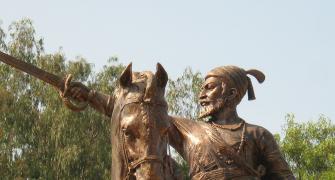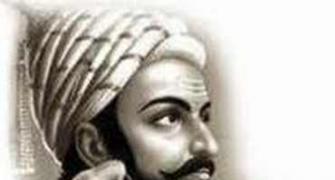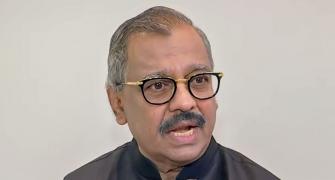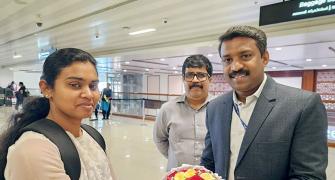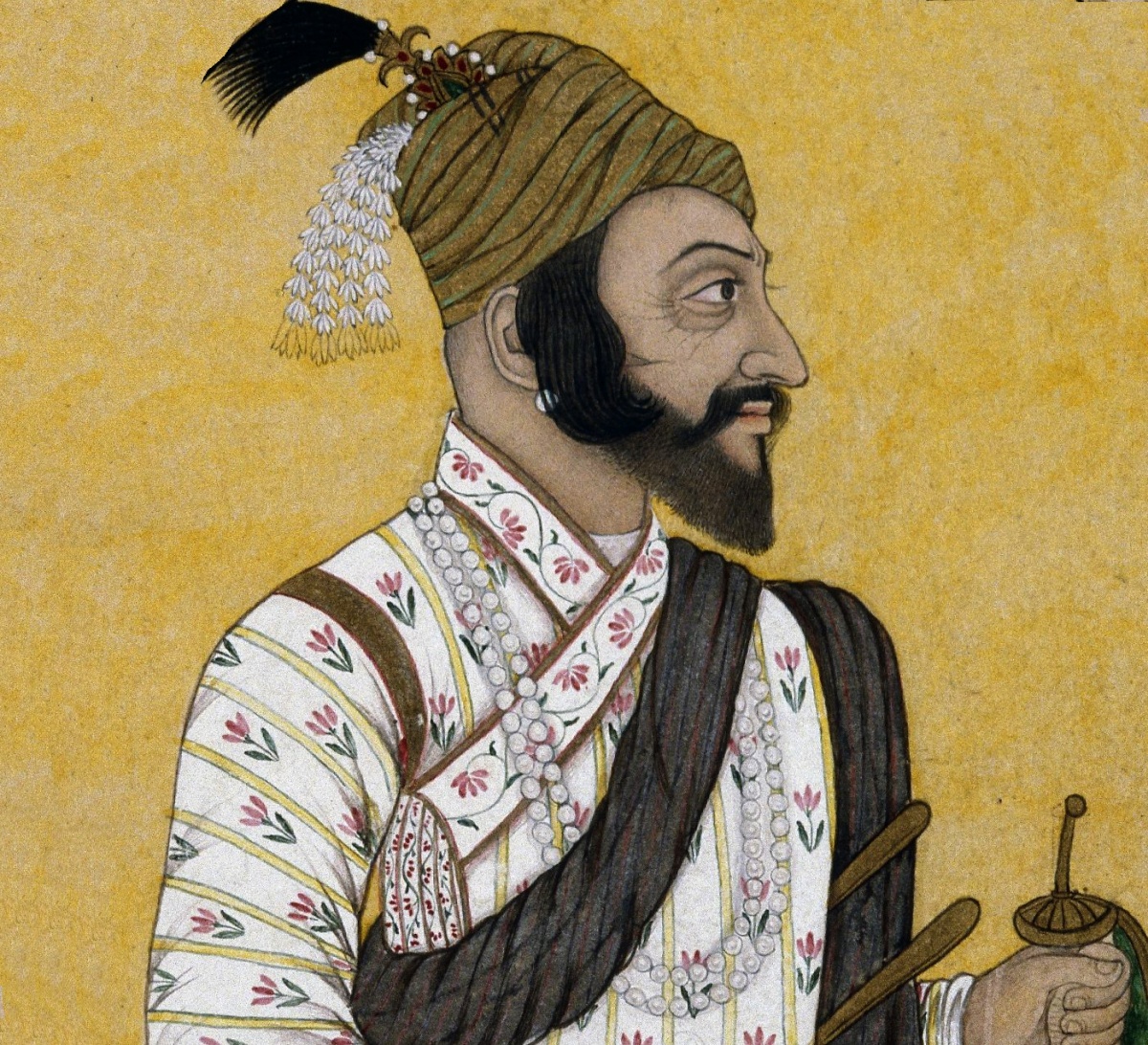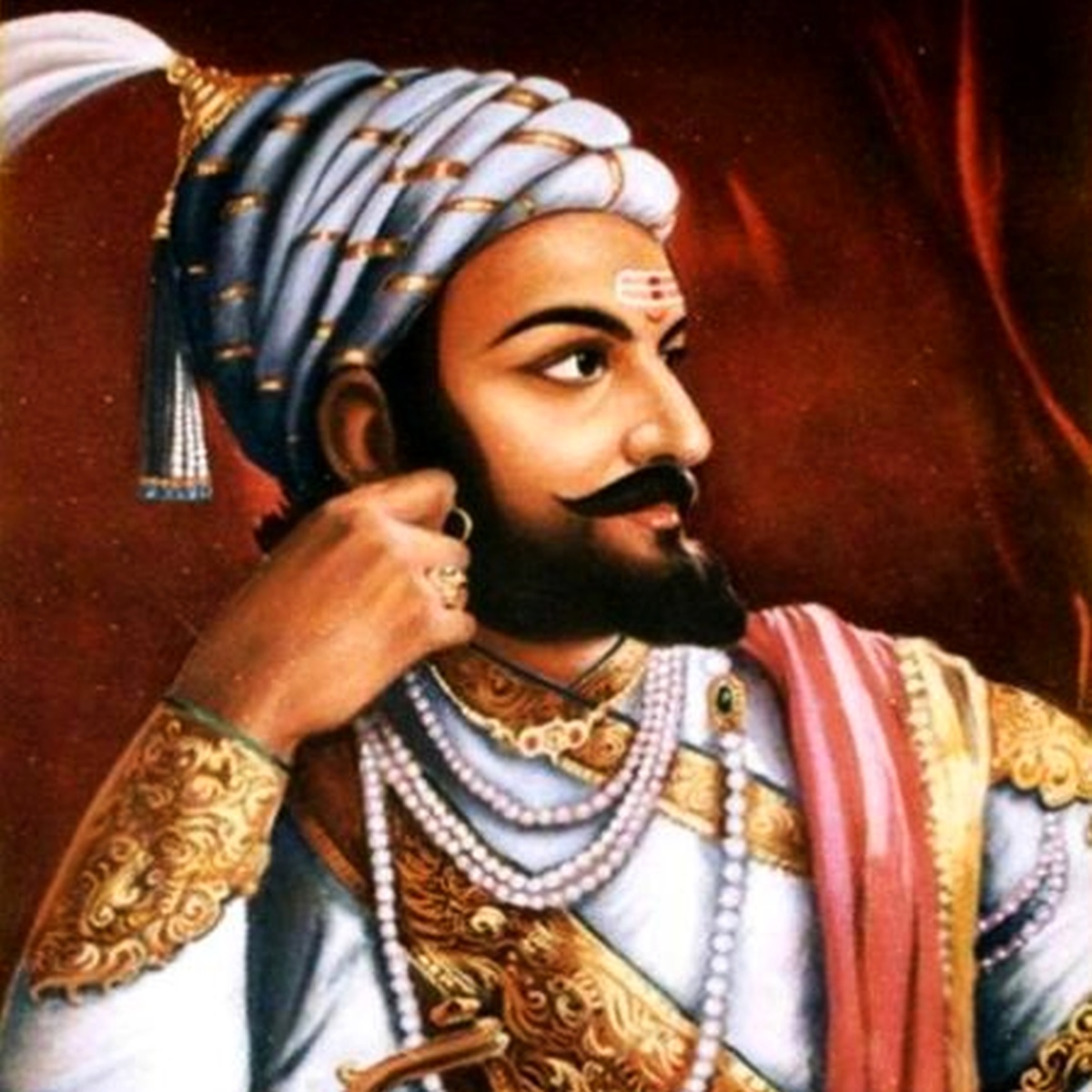In 1666, Shivaji Maharaj and his son Sambhaji escaped from the Agra Fort, one of the most miraculous escapes in India's history.
A fascinating excerpt from Colonel Anil A Athale's book, The Legacy Of SHIVAJI The Great.

Aurangzeb was stung by the disgrace of Shaiste Khan and resolved to teach the Marathas a lesson.
In December 1664, Rajput General Jai Singh, along with Diler Khan, was sent to Maharashtra with a huge army numbering over fifty thousand.
This army captured many towns including Poona and the nearby forts at Chakan and Supa.
At all these places the Marathas offered stiff resistance and the deeds of valour of Murarbaji Deshpande were truly inspiring. But the people suffered untold miseries and Shivaji tried to find a way out through compromise.
He wrote several conciliatory letters to Aurangzeb even as he attempted to woo the Rajput general to his cause.
Neither Jai Singh, the Rajput general, nor the emperor paid much heed to Shivaji's plea for peace. The Mughals continued with their depredations in Maharashtra.
At this point, Shivaji placed the welfare of his subjects above everything else and decided to accept a humiliating peace.
The Treaty of Purandar was concluded on 12 June 1665, under which Shivaji handed over twenty-three major forts to the Mughals including Sinhagad, Purandar, and Torna, and agreed to serve the Mughal emperor.
The Mughals saw this as an opportunity to conquer the Sultanate of Bijapur, a feat that had eluded three emperors before Aurangzeb.
Under the terms of the Treaty of Purandar, Shivaji was obliged to join the Mughals in the war against Bijapur.
A strange thing happened thereafter. Shivaji's most trusted General, Netaji Palkar, had a 'quarrel' with him and in a huff went away with a sizeable force and joined the Bijapur Sultan.
The Mughal generals, Jai Singh and Diler Khan, accompanied by Shivaji with a token force launched a major offensive against Bijapur.
The Bijapur forces comprising Netaji Palkar and a large Maratha force fought bravely and defeated the Mughals. After a year's fighting, the Mughals finally gave up their attempt to conquer Bijapur.
All this while, Shivaji continued his peace offensive with the Mughal Emperor. He wrote him a letter pledging his 'loyalty' to the empire and requested that he be appointed the subedar (governor) of the Deccan.
Aurangzeb was extremely sceptical of this expression of loyalty by Shivaji and suspected that once he gathered strength, Shivaji would become an independent king in the Deccan.
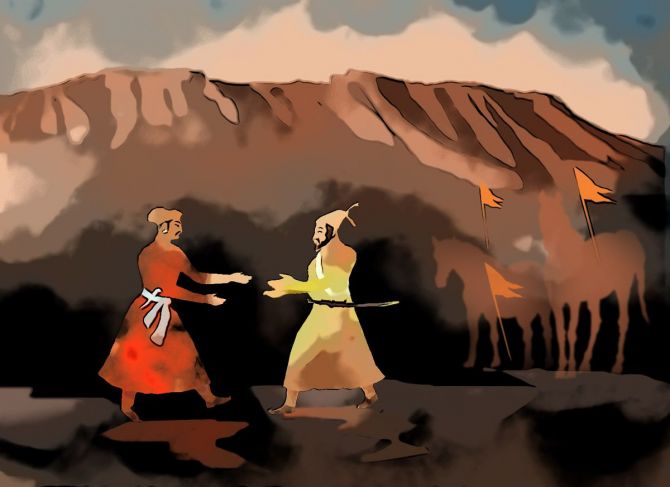
At the time he was trying to get the Mughal emperor to accept his position in the south, Shivaji also was working on another track, wooing the Rajputs.
Shivaji was keenly aware that a majority of the so-called Mughal army was in reality a Rajput-Mughal force.
Rajputs formed close to sixty percent of the army. In numerous meetings with Jai Singh, Shivaji tried to convince the Rajput general to join him in his quest for Hindavi Swarajya. He even offered to serve under the Rajputs for this purpose.
For his part, Jai Singh tried to convince Shivaji to join the Mughals and rule the south as part of the Mughal Empire.
The Maratha resistance at small fortresses like those of Supa, Chakan, and later Purandar had convinced Jai Singh that this was the best option for the Mughals.
The inability to subdue Bijapur further convinced him of the value of a Mughal-Maratha alliance.
Shivaji desperately needed peace to consolidate his Swarajya. As a last attempt to try to avoid conflict with the Mughals, he accepted Jai Singh's suggestion to visit Agra and personally convince Aurangzeb about the proposed collaboration.
In agreeing to go to Agra, Shivaji was taking a calculated but grave personal risk.
Jai Singh gave Shivaji his word of honour, promising the latter's safety.
Shivaji was confident that even Emperor Aurangzeb would not dare to go against the Rajput word of honour.
Aurangzeb's ruthlessness was well-known; after all, he had come to occupy the throne after killing two brothers and imprisoning his father.
On Monday, 5 March 1666, Shivaji and his son Sambhaji left Raigad for Agra accompanied by a retinue comprising some of his closest friends and a small contingent of bodyguards.
Such a visit would enable him to obtain first-hand knowledge about the inherent strength of the empire, to study men and matters on the spot, and thus to make it feasible for him to carry into effect his life's mission of a Hindu Padshahi (Hindu Empire).
He meditated on the subject in his mind and spent days in consultation with his mother and advisers.
He was constantly in touch with Jai Singh who sent solemn oaths about his safety as did his son Ram Singh, who served at the court.
Aurangzeb was to celebrate his accession to the throne at Agra on 12 May 1666, taking his seat on the peacock throne, his father Shah Jahan having died earlier in January.
That day the Diwan-e-Am (open court) of Agra presented a unique spectacle; all the Mughal splendour was on display. Shivaji was late and was led to the emperor in the Diwan-e-Khas (private court).
The Mughal prime minister, Asad Khan, led Shivaji and his son into the presence of the emperor.
Both father and son made their obeisance and offered the customary nazar (gifts), after which they were asked to stand in the third row of the nobles.
Shivaji noted the affront and burst out in open defiance as he complained of the breach of the terms that had been agreed upon.
The emperor noticed the outburst and sent Ram Singh to pacify Shivaji.
In the meantime, Shivaji left his place and moved to a corner, vehemently protesting.
The emperor closed the durbar and asked Shivaji to be taken away. Shivaji was placed under house arrest in Ram Singh's palace.

The emperor consulted Jai Singh but concluded that the only option was to do away with Shivaji.
The problem was how to do it without offending the Rajputs.
To do this quietly, Shivaji was moved to a secluded palace. From 12 May to 18 August 1666, Shivaji was confined to Agra.
All the while he was thinking of ways to escape from the prison. He ultimately devised an ingenious plan.
He began to pretend that he was ill. After pretending illness for some time, he sent away most of his followers because he did not have money to pay them.
The Mughals were happy when the 300-odd soldiers left. Shivaji began the practice of sending baskets of fruit and sweets to beggars and fakirs to pray for his early recovery.
On the afternoon of 19 August, he and his son squeezed themselves into two separate baskets of sweetmeats hanging from a bamboo pole on the shoulders of porters.
They were carried away without being detected by the guards on duty. His bodyguard occupied the bed with a bejewelled hand deliberately dangling outside the bedspread to allay any suspicions of the sentry.
After some time even the bodyguard slipped away with the request not to disturb the ailing Shivaji. The great escape was discovered only the next day.
That night, Shivaji went towards Mathura in the north rather than in the direction of Maharashtra which lies to the south, thus eluding the search parties that were sent out the next day.
From Mathura he went due east to the holy city of Prayag (Allahabad), possibly dressed as a sadhu.
He also separated from his son to avoid suspicion. After walking long distances and successfully evading Mughal soldiers searching for him, he reached Rajgad on 12 September 1666, to the immense relief and joy of the entire population of Maharashtra.
Excerpted from The Legacy Of SHIVAJI The Great by Colonel Anil Athale has been used with the kind permission of the publishers, Indus Source.
Colonel Anil A Athale (retd) is a military historian who has studied counterinsurgency in Kashmir, North East, Northern Ireland, South Africa and Sri Lanka. His columns can be read here.
Feature Presentation: Rajesh Alva/Rediff.com


